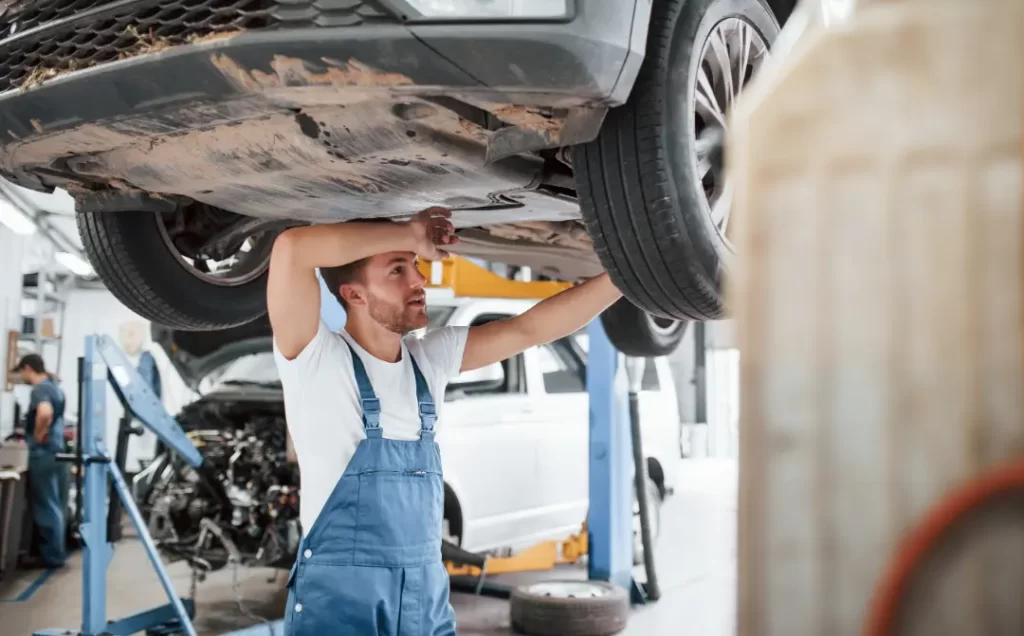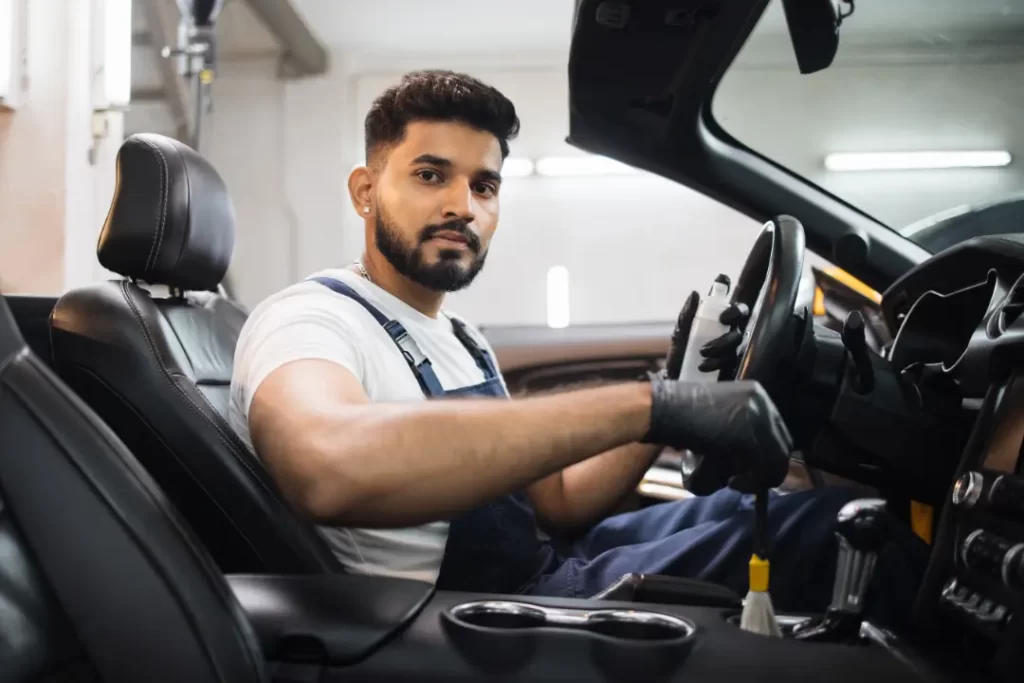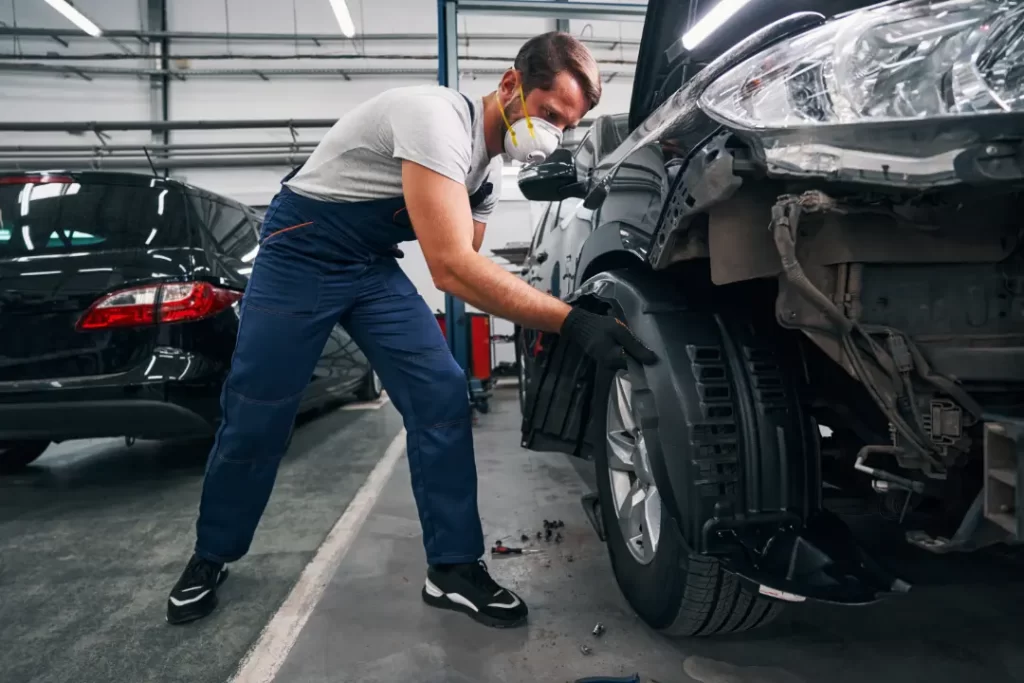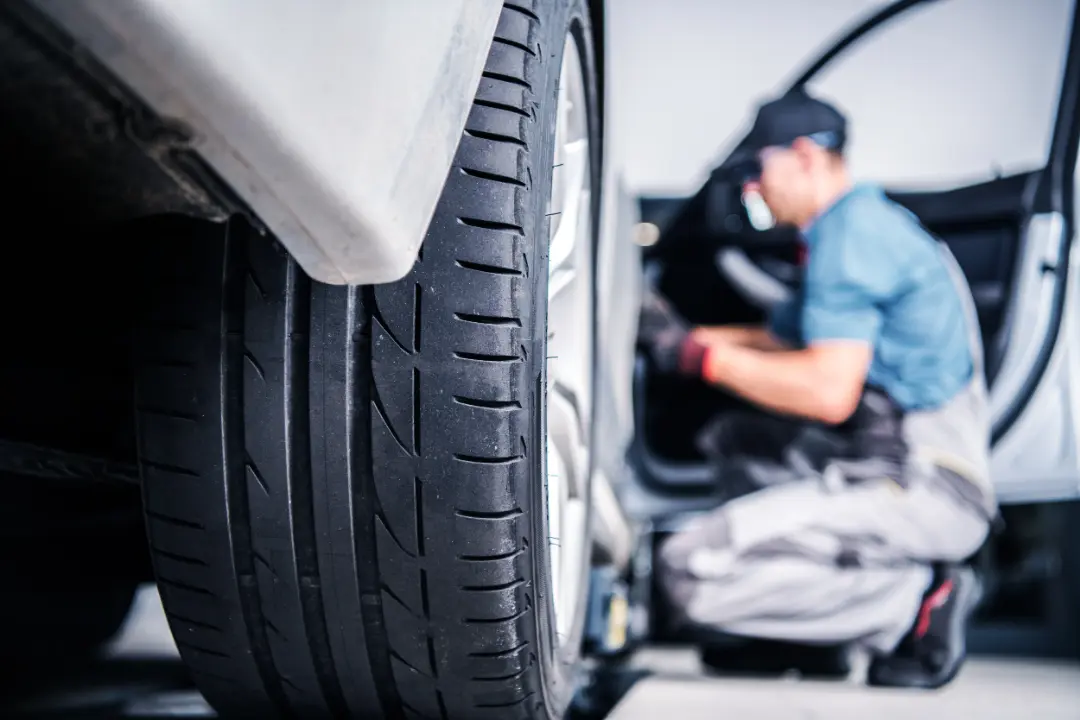When your car is in need of repairs, mechanics often conduct test drives to diagnose problems or confirm that repairs are complete. However, this leads to an important question: can a mechanic drive my car? And what should I anticipate during this process?
In this blog, we’ll cover the reasons why a mechanic might need to test your vehicle, the legalities involved, and your rights as a customer. We’ll also share strategies for protecting yourself and your vehicle, as well as what to do if you feel uncomfortable with a mechanic driving your car.
Key Takeaways
- Mechanics often need to drive your car to diagnose issues or verify repairs, especially for safety-critical systems like brakes, suspension, and steering.
- All Vehicle Services offers reliable and expert car care, specialising in diagnostics, repairs, and routine maintenance, ensuring your vehicle’s safety and performance.
- As a customer, you have the right to clear communication, consent, and privacy when allowing a mechanic to test drive your car.
Why Would a Mechanic Need to Drive My Car?
Many drivers feel uneasy handing over their keys and allowing a mechanic to take their car out for a spin, and that’s understandable. After all, your car is not just an investment; it’s your means of transportation and often contains personal belongings and data.
However, mechanics often need to test-drive vehicles for two main reasons: diagnosing issues and verifying repairs. These drives are essential for ensuring the safety and performance of your car.

Diagnosing Problems
Some issues only occur while driving, and a mechanic may need to experience them firsthand. Common examples include:
- Strange noises: Sounds like clunking, squealing, or grinding may only happen under certain driving conditions, like while turning or braking.
- Vibrations or pulling: A mechanic may need to check for vibrations or steering problems, which can be caused by suspension or alignment issues.
- Performance issues: Problems like poor acceleration or shifting issues may not be noticeable when the car is stationary and require a test drive for accurate diagnosis.
Post-Repair Testing
After a repair, mechanics often test-drive the car to ensure the problem has been fixed and that the car is safe to drive. This is especially important for repairs involving safety-critical systems like brakes, suspension, and steering.
- Brake performance: Mechanics will test the brakes to ensure they engage smoothly and stop the car safely.
- Handling and steering: After suspension or steering work, a test drive verifies that the vehicle handles correctly in real-world conditions.
What to Expect When a Mechanic Drives Your Car
If your mechanic needs to drive your car, here’s what you can generally expect:
Clear Communication and Transparency
A reputable mechanic should communicate clearly why a test drive is necessary. They should explain what they are trying to diagnose or verify and provide a general estimate of how far and how long they plan to drive your vehicle.
If the mechanic is vague or evasive about the need for a test drive, that’s a red flag. You have every right to ask for more details about the test, including the route they plan to take and the conditions under which they will drive the car.
Distance and Duration
Test drives for diagnostic purposes or to verify repairs are typically brief, usually covering 5 to 10 miles. Mechanics will often drive the vehicle on local roads or nearby highways to recreate real-world conditions. For example:
- If the issue occurs at lower speeds, such as a noise when turning or braking, a short drive around the block may be enough to pinpoint the problem.
- If the problem arises at higher speeds or after the vehicle has warmed up, a longer test drive on the highway might be necessary. In such cases, the mechanic should inform you ahead of time if they need to take the vehicle for an extended drive.
By simulating the conditions where the issue occurs, mechanics can accurately diagnose and verify the success of repairs, ensuring your vehicle is fully functional before returning it to you.
Protecting Your Privacy
With modern cars increasingly connected to technology, many vehicles store personal data in their navigation and infotainment systems, as well as phone contacts. If you’re concerned about privacy when leaving your car for repairs, there are steps you can take to protect your information.
- Clear Personal Data: Before heading to the repair shop, clear any stored data from your vehicle’s infotainment system. This includes home addresses, contacts, and recent destinations. Most cars offer a “factory reset” option to erase all saved information.
- Disconnect Devices: Ensure that all personal devices, like smartphones, are disconnected from the vehicle’s Bluetooth system. Doing this before service will safeguard your information during any test drives or diagnostics.
Mechanic’s Permission to Drive Your Car
Although allowing a mechanic to drive your car is often necessary for diagnosing issues or verifying repairs, it is important to understand your rights and the mechanic’s responsibilities. Here are some key points to keep in mind:
- Mechanics Driving Your Car: In many cases, mechanics will need to test-drive your vehicle to diagnose problems or confirm that repairs are successful. This is standard practice in the industry. However, they should always inform you and obtain your explicit permission before taking your car on the road.
- Overnight Situations: If your car remains at the garage overnight, some mechanics may assume implicit permission to move it or even take it home. However, this should be clearly communicated, and you have the right to set boundaries on where your car can go.
- Shop Policies: Reputable repair shops will have a clear policy regarding road test drives, which should be disclosed when you drop off your vehicle. If this isn’t discussed upfront, don’t hesitate to ask how far and for what purpose they will drive your car.
- Personal Use and Unauthorised Driving: Your car should only be driven for legitimate business purposes, like a test drive. If a mechanic uses your vehicle for personal reasons without your permission, this could be considered unauthorised possession, and you have the right to take action.
- Insurance Coverage: Before allowing a mechanic to drive your car, ensure that they are fully insured. If the shop’s insurance does not cover the mechanic or your vehicle, you may be liable for any damages. Always confirm this with your service manager to avoid any unpleasant surprises and incurring costs.
- Liability for Damages: If a mechanic drives your car without permission and causes damage, you may have the right to seek compensation. Be sure to discuss this with your service manager and understand the shop’s policies for such situations.
- Your Rights: You are fully within your rights to ask detailed questions about the mechanic’s test drive, including the route, duration, and reason for the drive. If you feel uncomfortable at any point, trust your instincts and address your concerns with the service manager.
Remember, communication is key. Establish clear expectations with your mechanic to ensure you’re comfortable with how your vehicle is handled.
Your Rights as a Customer
As a customer, you have specific rights when it comes to a mechanic driving your car:
Transparency and Consent
A mechanic must get your permission before taking your car for a test drive. You can ask them to explain why the test drive is needed, how far they plan to go, and if there are other ways to test the car without driving it.
Feel free to ask the mechanic or shop manager why they need to drive your car, what they’ll be checking, and what route they’ll take. This will help you feel more confident about the decision.
Insurance and Liability
As mentioned, the repair shop’s insurance should cover your car while they have it. It’s always a good idea to double-check if the shop has enough coverage. If you’re worried, ask to see proof of their insurance.
If your car gets damaged during a test drive, the shop’s insurance cover should take care of the repairs. If the shop doesn’t take responsibility, you can involve your own insurance company and even consider legal advice if needed for further queries.
The Right to Refuse
You can say “no” if you don’t want a mechanic to drive your car. If you’re uncomfortable or feel it’s unnecessary, ask if they can use other methods, like diagnostic tools, to figure out the problem without driving.
Sometimes, mechanics can use equipment that simulates driving conditions, like wheel alignment machines or engine diagnostic tools, to test your car without needing to take it on the road.
What to Do If You’re Uncomfortable with a Mechanic Driving Your Car
It’s completely understandable if you’re not comfortable with the idea of a mechanic driving your car. Here are some steps you can take:

Ask for Alternatives
Some mechanics can use specialised diagnostic tools to simulate driving conditions without actually taking your car on the road. For example, electronic diagnostic tools can read error codes, and wheel alignment machines can test handling without a test drive.
Advanced equipment, such as engine diagnostic tools or roller brake testers, can often provide the necessary data without requiring a test drive.
Ride-Along Option
Many mechanics offer customers the option to ride along during the test drive. This allows you to observe the mechanic’s process, see how they are diagnosing the issue, and feel more in control of the situation.
Riding along with the mechanic during a test drive is a great way to address your concerns while allowing the mechanic to perform their job. It also provides an opportunity to point out the problem you’re experiencing directly.
Choose a Trusted Mechanic
If you’re nervous about allowing a mechanic to drive your car, choosing a reputable repair shop with a strong track record of customer satisfaction is essential.
What Happens If a Mechanic Damages My Car During a Test Drive?
Accidents can happen, and while it’s rare, a mechanic could damage your car during a test drive. Here’s how to handle the situation if it occurs:

Understanding Liability
If a mechanic damages your vehicle during a test drive, the repair shop’s insurance policy should cover any repairs. Most reputable shops carry commercial insurance that extends to a customer’s car vehicles in their possession, including while driving.
Handling Disputes
If the shop refuses to take responsibility for the damage, you can involve your insurance company to resolve the issue. In more serious cases, legal advice may be necessary to ensure that the repair shop is held accountable.
Nevertheless, before leaving your car with a mechanic, it’s a good idea to take photos of your vehicle’s condition, particularly areas near the parts being repaired. This documentation can help in case of any disputes over damage.
The Importance of Test Drives for Safety-Critical Repairs
Test drives are often essential for verifying that safety-critical systems like brakes, suspension, and steering are working correctly. While it might seem like an unnecessary step, a test drive ensures that your vehicle is fully roadworthy before you drive it home.
Critical Systems Testing
For brakes, steering, or suspension repairs, a test drive is often required to confirm that the repair was successful and that the car handles safely under real-world conditions.
- Brake Testing: After replacing or adjusting brakes, mechanics need to ensure that the car stops safely and that there are no abnormal noises or vibrations.
- Suspension and Steering: Repairs to these systems require verification during a drive to check for proper handling, stability, and ride comfort.
Manufacturer Requirements
In some cases, vehicle manufacturers require test drives as part of the repair process, particularly after repairs to high-performance components or systems involving electronic controls. This ensures that the vehicle meets the manufacturer’s specifications for safety and performance.
Original Equipment Manufacturer (OEM) guidelines often include test drives as part of the repair process to ensure that the vehicle meets the manufacturer’s safety and performance standards.
All Vehicle Services: Reliable, Affordable, and Expert Car Care You Can Trust
At All Vehicle Services, we pride ourselves on providing top-notch car repair and maintenance solutions in Sittingbourne. Whether you need routine servicing, a quick MOT, or emergency car repairs, we are your one-stop shop for all vehicle needs. Our services include brake repairs, clutch replacements, tyre fitting, computer diagnostics, steering and suspension adjustments, and air conditioning regas. We also specialise in full safety analyses and oil changes, ensuring your vehicle runs smoothly and safely.
Why Choose All Vehicle Services?
With over 50 years of combined experience, our qualified and professional technicians are well-equipped to handle any issue, no matter how big or small. We understand that entrusting your car to a garage requires confidence in the team’s expertise and workmanship. That’s why we go the extra mile to deliver reliable, affordable, and timely services that keep our customers satisfied and their vehicles in top shape. Our Sittingbourne garage is fully equipped with state-of-the-art tools and diagnostic equipment to ensure every job is done to the highest standards.
We believe in transparency and offer competitive rates with no hidden charges. Whether you’re coming in for a quick servicing or a complex repair, you can trust that we’ll provide value for money without compromising on quality.
Exceptional Service Awaits
With a team of highly trained mechanics, we specialise in all aspects of vehicle repair and maintenance. Our experts are adept at diagnosing and fixing issues ranging from electrical systems to complex mechanical problems.
At All Vehicle Services, customer satisfaction is our top priority. No matter your car’s needs, we are dedicated to delivering exceptional service and ensuring your vehicle is safe, reliable, and roadworthy.
Book your service to experience the best in car repair and maintenance in Sittingbourne.
Frequently Asked Questions
Do mechanics need my permission to drive my car?
Yes, mechanics are legally required to obtain your permission before driving your car. Most repair shops include this in their service agreement, but you can always ask for clarification on why a test drive is necessary before giving consent.
What happens if a mechanic damages my car during a test drive?
If a mechanic damages your car during a test drive, the repair shop’s commercial insurance should cover the cost of repairs. This coverage applies to customer cars being test-driven. It’s always a good idea to ask the shop to confirm they have appropriate insurance for customer cars before allowing a mechanic to drive your vehicle. Additionally, check if the shop’s car park is secure and well-managed to prevent any accidental damage while your car is parked.
Can I ride along with the mechanic during the test drive?
Yes, many mechanics will allow you to ride along during the test drive. This can help you feel more comfortable and allows you to point out the issues you’re experiencing while the mechanic is behind the wheel.
Conclusion
While allowing a mechanic to drive your car may feel daunting, test drives are often essential for diagnosing problems and verifying repairs. However, they should always be conducted with your knowledge and consent, and the repair shop should be transparent about why a test drive is needed.
By choosing All Vehicle Services, you can ensure your vehicle is handled carefully. Remember, the goal of a test drive is to ensure that your car is safe and fully repaired, providing you with the peace of mind you need when you get back behind the wheel.

